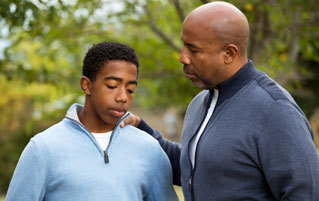5 Problems You Can't Blame on How You Were Raised

When my parents were raising me, there was one parenting style: Keep Your Child Alive.
That was it.
If a given activity could kill my brothers or me, like riding our bikes off the garage roof (even though we were holding an umbrella!), it was forbidden. If an activity kept us occupied for more than five minutes, my folks invested large sums of money in making sure that activity (books, LEGOs, Nintendo) was available to occupy our attention spans all day.

We didn't have iPads, but we made do, dammit.
My mom even organized a Nintendo Kids Club with our classmates. In this way, her sons' favorite activity had a ripple effect throughout the community, allowing neighborhood parents more time to sleep, iron, and watch General Hospital. (It was the 1980s. Everyone ironed their clothes while they watched General Hospital, and then they slept. I think this was called "Reaganomics," but I also have no idea what that term means.)
My mother -- hero to local parents, enemy of Ganon.
Today there are a variety of parenting styles. There are Tiger Moms, who are strict. There are Helicopter Parents, who hover over their kids' activities. At the opposite end of the spectrum there are the Free-Range Parents, who raise their children to become chickens.

Some prefer the Veal Method.
Bestsellers have been written about these styles, and articles about how to parent are Internet catnip.
Framing the perennial debate about parenting styles is the widely held assumption that parenting matters at all -- the worry that if a father misses his daughter's second bassoon recital, she will someday twerk all up on Robin Thicke. The importance of nurturing is woven into the social fabric by pop culture, religion, the media, families, and Big Greeting Card. Yet there's an obvious question that rarely gets asked during the parenting wars: What if parenting style doesn't influence kids all that much?
There is a considerable body of research, most of it collected through studying twins and adopted siblings, which says parents don't matter to the degree that moms and dads and the piano teacher industrial complex say they do. This research says that nature (genes) tends to outweigh nurture (parenting) when it comes to such things as character, health, and chances for success.

Of course, your kids usually get your genes and your parenting, so you're to blame either way.
Does this mean parents don't make a difference? No one is claiming that. The data says that parents still have the power to steer kids to smarter choices or to screw them up, particularly in the short term. The question is: How big of a difference do parents make in the long term? Parental influence is still being studied, and new information is surfaced every year, but the weight of the evidence currently bends in the direction of nature playing a significant role, particularly when it comes to ...
Education

If you have five siblings, and they all got good grades, and you received terrible grades, then you might be the mailman's kid. I'm sorry you had to find out this way -- through a Cracked article. It's not our fault. You and your mailman should have had this talk a while ago.

He sent you a letter, but who reads that shit?
Just as with money, there is evidence that genes have an effect on grades. In 2013, British researchers studied the academic performance of more than 11,000 identical and non-identical 16-year-old twins. They found that genes contributed more to students' grades than teachers, schools, or family environments. These findings have been repeated in other studies, as well as on the 1980s television program Diff'rent Strokes, where Willis sometimes struggled with his grades even though he and his brother Arnold had been adopted by a wealthy Manhattan industrialist.
An analysis of Korean-American adoptees found that being raised by a college-educated mother increased an adoptee's probability of graduating from college by 7 percent. By comparison, a child with a college-educated biological mother had a 26 percent increase in the probability of graduating from college. It didn't matter if the adoptive parents were rich or educated.

Or even if the kids wrote poignant essays about their pride in being adopted.
Perhaps, looking back on it, this is what Willis was talking about.
Happiness

One study of Minnesota twins (the people, not the baseball team) found that about half of an individual's happiness is inherited. Other studies, social scientist Arthur C. Brooks points out, say that about 40 percent of happiness is determined by recent events, which is happiness that is fleeting. The last 10 percent or so is largely determined by the individual, which explains phenomena such as Tony Robbins and yard margaritas.

The percentages derived from pizza proved to be incalculable.
In the book Selfish Reasons to Have More Kids, economist Bryan Caplan says that parents grossly overestimate how much they can actively influence a child's happiness. He bases this conclusion on data showing that identical twins (who share identical DNA) are far more similar in their happiness levels than fraternal twins (who do not share the same DNA).

Of course, identical twins are naturally happier because they indulge in wacky twin hijinks.
Good news for parents of sullen teens: Research shows that unhappiness is largely genetic, rather than the result of external factors, like whether your mom hugged you enough. "By the time you're an adult," Caplan writes, "your parents' past mistakes are not the reason for your present unhappiness."
To which he should have added, "So, good luck with that."
Character

No one looks down into their child's crib and says, "I hope we raise him to become a real asshole." And yet somehow assholes are all around us -- in traffic, in online comment sections, in bars, and at work. The world does not suffer from a shortage of un-self-aware, disagreeable jerks. Is bad parenting the reason to blame for the rising national tension in Whole Foods parking lots, or is it something deeper?

Is it jazz music? I bet it's jazz music.
Research on twins (are twins only bred for science now?) says that genes do influence personality, but it's not known yet how. Billions of dollars of research into human DNA has yet to turn up specific genes for determining things like doing your roommate's dishes for them or politely waving to the car behind you when its driver lets you merge into traffic. (Please keep looking, science, we need more of these people.)
Can biology explain criminal behavior? More than 100 studies show that inherited traits play a role in crime. But just because someone is predisposed to criminal behavior does not mean they will become a criminal. Nurture can play a role in subduing criminal impulses and redirecting them to more productive pastimes such as MMA or serving in Congress.

"You're right ... being able to rob the whole country at once is so much more efficient! Thanks!"
Weight

If you have ever watched a parent try to feed a 3-year-old something he does not want -- or if you have stumbled upon a bowl of broccoli rotting in a toy chest -- then you have witnessed just one battle in the awesome war of nature versus nurture. When it comes to obesity, nature sticks a fork in nurture, dips it in syrup and washes it down with regular soda.

That's why the blood of a mad fat man tastes so sweet.
Whether a person is fat as a child or as an adult is a trait that is "substantially heritable," according to researchers.
Scientists have even isolated a gene in mice that affects weight (so if you start to see more sexy slim mice, this is probably why). The mice in the study ate the same amount of calories as their peers, but with one genetic alteration they gained weight. Scientists hope this information will help humans someday with weight gain and loss.

Dietitians recommend eating fewer than five mice per week.
This is because it is known that human genes can influence how much food turns into fat and how much food gets burned off. The good news is that diet and exercise can still keep one fit. The bad news is that being skinny is way harder for those of us who still hide broccoli in the furniture.
Parenting

Yes, a child's genes even influence how their parents treat them. So if you're following along, the genes that a parent passes along to a child, when expressed by the child, can predictably affect the way the parent interacts with the child. Parenting is a Rube Goldberg machine of diapers, tantrums, and subpar refrigerator art.

For example, mom treated your sister better because she was prettier than you.
A review of dozens of studies of more than 14,600 sets of twins showed that a child's genetics "significantly" affect how parents parent. One example: For boys, a region in the gene that codes for the serotonin transporter actually predicts how angry mom will get when her son, for example, hides the car keys in the toilet. Researchers say that socioeconomic and cultural differences as well as friends and school also factor into parenting differences.
According to the review's authors, this "means that parenting should not be viewed solely as a characteristic of the parent, but as something that results from both parental and child attributes," adding: "There isn't one style of ideal parenting. Each child requires a different environment to excel. So parents should not invest a lot of effort in trying to treat their children similarly, but instead, be aware of the variation in their children's attributes and nurture them accordingly."

"Should not invest a lot of effort." Got it.
Explaining this idea to siblings who think everything has to be fair can be difficult, but parents can take heart knowing that even if they fail to explain themselves properly, they probably won't scar their kids for life.
Joe Donatelli is a freelance journalist who publishes The Humor Columnist.
Always on the go but can't get enough of Cracked? We have an Android app and iOS reader for you to pick from so you never miss another article.
